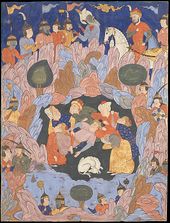Template:Pictorial-Islam-options: Difference between revisions
| [checked revision] | [checked revision] |
mNo edit summary |
mNo edit summary |
||
| Line 1: | Line 1: | ||
<noinclude>Also see: [[Template:Pictorial-Islam]]</noinclude><!-- HELP NOTES: Each option tag handles one random story --><choose> | <noinclude>Also see: [[Template:Pictorial-Islam]]</noinclude><!-- HELP NOTES: Each option tag handles one random story --><choose> | ||
<option weight="1">{{Pictorial-Islam|1=Khadijah bint Khuwaylid|2=[[File:Khadijah bint Khuwaylid.jpg|260px|link=Khadijah bint Khuwaylid]]|3=Khadijah or Khadīja bint Khuwaylid (خديجة بنت خويلد) was Prophet Muhammad’s first wife and she was his only wife as long as she lived. She is known to Muslims as al-Kubra (“the Great”) and al-Tahira (“the Pure”). Twelve of Muhammad’s wives are credited with the title Umm al-Muminun (“Mother of the Faithful”), but Khadijah occupies a unique position as the Mother of Islam itself. | |||
Islam changed direction after Khadijah’s death. Within seven weeks Muhammad had become a bigamist. At the same time he began negotiations for military alliances with foreign tribes, although it was to be another two years before he succeeded in declaring war on Mecca. Even the sections of the Qur’an that were composed at the end of Muhammad’s Meccan period, though narrative rather than legislative, read more like the flat prose of Medina than the poetry of Khadijah’s lifetime. It is frequently said that “Islam arose by Ali’s sword and Khadijah’s wealth.” It is clear that what Khadijah contributed to the foundations of Islam was far more than money. ([[Khadijah bint Khuwaylid|''read more'']])}}</option> | |||
Revision as of 20:30, 10 January 2014
Also see: Template:Pictorial-Islam
|
